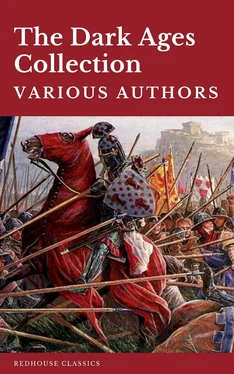If there was one man whom John detested and envied it was the general Belisarius, who in A.D. 540 arrived at Constantinople, bringing the king of the Ostrogoths as a captive in his train. If any man was likely to be a dangerous rival in a contest for the throne, it was the conqueror of Africa and Italy, who was as popular and highly respected as John himself was unpopular and hated. As a matter of fact, thoughts of disloyalty were far from the heart of Belisarius, but he was not always credited with unswerving fidelity to Justinian, even by Justinian himself.
Belisarius, like his master, was born in an Illyrian town, 147and, like his master, he had married a woman whose parents were associated with the circus and the theatre and who was the mother of children before she married the soldier. 148Unlike Theodora, she did not mend her morals after her marriage, and her amours led to breaches with her husband. But notwithstanding temporary estrangements she preserved the affection of her husband, who had a weak side to his character, and she faithfully accompanied him on his campaigns and worked energetically in his interests. She often protected him, when he was out of favour with the Emperor, through her influence with Theodora, who found her a useful ally and resourceful agent.
The cunning of this unscrupulous woman compassed the fall of John of Cappadocia. She was interested in destroying him as the enemy both of her husband and of her Imperial mistress. The only hope of damaging him irretrievably in the eyes of the Emperor was to produce clear evidence that he entertained treasonable designs, and for this purpose Antonina resorted to the vile arts of an agent provocateur. The Prefect had a daughter, his only child, whom he loved passionately; it was the one amiable trait in his repulsive character. His enemies could cast no reproach on the virtue of Euphemia, but she was very young and fell an easy victim to the craft of Antonina. It was in April or May A.D. 541 that the treacherous scheme was executed. Belisarius had set out in the spring to take command in the Persian war, and his wife had remained for a short time at Constantinople before she followed him to the East. She employed herself in cultivating the acquaintance of Euphemia, and having fully won her friendship she persuaded the inexperienced girl that Belisarius was secretly disaffected towards Justinian. It is Belisarius, she said, who has extended the borders of the Empire, and taken captive two kings, and the Emperor has shown little gratitude for his services. Euphemia, who, taught to see things through her father’s eyes, feared Theodora and distrusted the government, listened sympathetically to the confidences of her friend. “Why,” she asked, “does Belisarius not use his power with the army to set things right?” “It would be useless,” said Antonina, “to attempt a revolution in the camp without the support of civilian ministers in the capital. If your father were willing to help, it would be different.” Euphemia eagerly undertook to broach the matter to her father. John, when he heard his daughter’s communication, thought that a way was opened for realising the vague dreams of power which he had been cherishing. It was arranged that he should meet Antonina secretly. She was about to start for the East, and she would halt for a night near Chalcedon at the palace of Rufinianae, which belonged to her husband. 149Hither John agreed to come secretly, and the day and hour were arranged. Antonina then informed the Empress of all she had done and the details of the scheme. It was essential that the treasonable conversation should be overheard by witnesses, whose testimony would convince Justinian. Theodora, who entered eagerly into the plot, chose for this part the eunuch Narses, and Marcellus, commander of the Palace guards, a man of the highest integrity, who stood aloof from all political parties, and never, throughout a long tenure of his command, forfeited the Emperor’s respect. 150Theodora did not wait for the execution of the scheme to tell Justinian of what was on feet, and it was said that he warned John secretly not to keep the appointment. This may not be true. In any case, John arrived at Rufinianae at midnight, only taking the precaution of bringing some of his armed retainers. Antonina met him outside the house near a wall behind which she had posted Marcellus and Narses. He spoke, without any reserve, of plans to attempt the Emperor’s life. When he had fully committed himself, Narses and Marcellus emerged from their hiding-place to seize him. His men, who were not far off, rushed up and one of them wounded Marcellus. In the fray John succeeded in escaping, and reaching the city he sought refuge in a sanctuary. 151The historian who tells the tale thought that if he had gone boldly to the Palace he would have been pardoned by Justinian. But the Empress now had the Emperor’s ear. John was deprived of the office which he had so terribly abused and banished to Cyzicus, where he was ordained a deacon against his will. His large ill-gained possessions were forfeited as a matter of course, but the Emperor showed his weakness for the man by letting him retain a considerable portion, which enabled him to live in great luxury in his retirement. 152
But he was not long suffered to enjoy his exile in peace. The bishop of Cyzicus, Eusebius, was hated by the inhabitants. They had preferred charges against him at Constantinople, but his influence there was so great that he was able to defy Cyzicus. At last some young men, who belonged to the local circus factions, murdered him in the market-place. As it happened that John and Eusebius were enemies, it was suspected that John was accessory to the crime, and, considering his reputation, the suspicion was not unnatural. Senators were sent to Cyzicus to investigate the murder. John’s guilt was not proved; 153but the commission of inquiry must have received secret orders to punish him rightly or wrongly, for he was stripped and scourged like a common highwayman, and then put on board ship, clad in a rough cloak. The ship bore him to Egypt, and on the voyage he was obliged to support life by begging in the seaports at which it called. When he reached Egypt he was imprisoned at Antinoopolis. For these illegal proceedings the Emperor, we may be sure, was not responsible, and no private enemy could have ventured to resort to them. The hand of Theodora could plainly be discerned. But she was not yet satisfied with his punishment; she desired to have him legally done to death. 154Some years later she got into her power two young men of the Green faction who were said to have been concerned in the murder of the bishop. By promises and threats she sought to extract a confession implicating John the Cappadocian. One of them yielded, but the other, even under torture, refused. Baffled in her design she is said to have cut off the hands of both the youths. 155John remained in prison till her death, after which he was allowed by the Emperor to return to Constantinople, a free man, but a priest. Yet it was said that he still dreamed of ascending the throne. 156
It is incontestable that Theodora performed a public service by delivering the eastern provinces from the government of an exceptionally unscrupulous oppressor, and that his sufferings, although they were illegally inflicted, were richly deserved. But the revolting means imagined by her unprincipled satellite Antonina and approved by herself, the employment of the innocent girl to entrap her father, 157do not raise her high in our estimation. It must be observed, however, that the public opinion of that time found nothing repulsive in a stratagem which to the more delicate feelings of the present age seems unspeakably base and cruel. For the story is told openly in a work which the author could not have ventured to publish if it had contained anything reflecting injuriously on the character of the Empress. 158
Читать дальше












